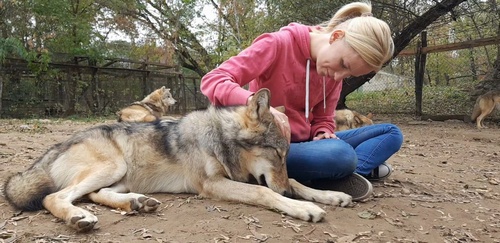A new study finds it does not take generations. Tame socialized grey wolves form individualized social bonds with their human handlers. And they don't like being separated any more than dogs do.
"Attachment is a so-called behavior-complex, what has several manifestations. For instance, dogs seek protection from their owners in threat or they are calmer in new situations when their owner is present, but they show signs of stress in their absence. We were wondering whether intensively socialized adult wolves show at least some features of the attachment behavior towards their handlers," says explained Dr. Rita Lenkei, first author of the study.

Photo: Paula Pérez Fraga
The researchers tested hand-raised wolves and family dogs in a separation test, where the subjects were left alone by their handler or by a stranger for three minutes at an unfamiliar place. They found little difference between the wolves' and dogs' behavior during the test. When their handler - or owner in case of the dogs - was present they were calmer, they spent their time exploring their vicinity and sniffing around. But when they were left by their handler, they became stressed, whined and pulled the leash towards her hiding place. However, when the stranger disappeared these behaviors barely appeared.
The researchers also found species specific differences, as besides the domestication, the artificial selection and also rearing conditions markedly shaped the dog's behavior. For instance, dogs were more interested towards humans, regardless of her familiarity. This result is in line with earlier findings that dogs are generally more attracted towards humans from early puppyhood what might be caused by genetic differences between dogs and wolves. Besides, wolves pulled the leash more persistently what the researchers explained with the assumption that owners usually teach their dogs not to pull it from their early age.
Though the dog-human relationship resembles to the offspring-parent bond from several aspects, based on earlier studies wolf puppies do not show attachment towards their human caregivers. As in this experiment the subjects were adult individuals and their handler was not their original caretaker, these results raise the possibility that the evolutional origin of the human-dog attachment is the social bond between the members of the pack. Wolves live in families, usually consisting a mating pair and their offspring of different ages. Presumably the common ancestor also lived in a similar complex social environment what might provide a good basis for developing abilities to easily integrate into human social groups.






Comments